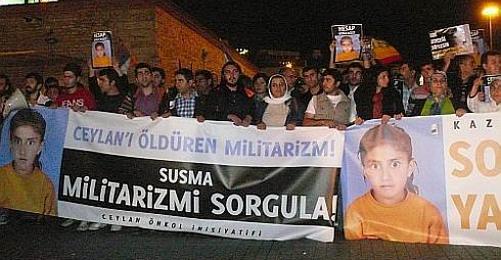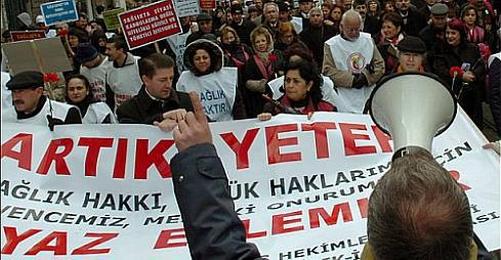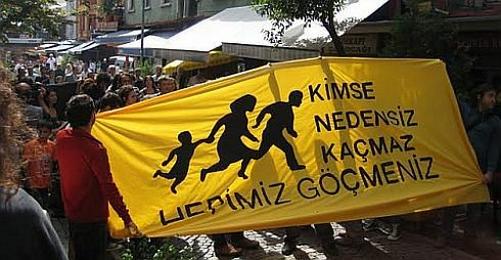In the whole of Turkey, there are 18 female mayors, and only one of them is mayor in a province capital. The number has not changed over two local elections, that is since 1999.This means that the percentage of women among all of the 3,225 mayors of Turkey is 0.6 percent.
Of the female mayors, four are from the Republican People’s Party (CHP), three each from the ruling Justice and Development Party (AKP) and the Social Democratic People’s Party (SHP) and one from the True Path Party (DYP). The pro-Kurdish Democratic Society Party (DTP) has brought seven women into a mayor’s office, and one of them, Songül Erol Abdil, is mayor of the southeastern province capital of Tunceli.
Embarrassing global ranking
If one compares Turkey’s situation with that of other countries, Turkey is 62nd of 68 countries in terms of female representation in local government.
In terms of female mayors, Turkey is 54th of 57 countries.
Globally, men occupy 82 percent of seats in national parliaments; in Europe, this percentage is lower: 77 percent. In most countries, more women are present in local governments than in national parliaments.
This is because local services often target women. Work on infrastructure in neighbourhoods, child care and other services for children, the elderly and the disabled still affect more women than men. It is thus profitable for women to become active in local government.
Wealthy men go into local politics
However, in Turkey the situation is the other way around. The percentage of women in national parliament since the general elections of July 2007 is 9.1. Compared to that, the percentage in local government is nearly zero.
This can be explained with the fact that influential men are eager to control local profit-making opportunities. Thus, a pre-condition for becoming active in local politics is to be wealthy. Before they even knock on the doors of parties, women lose out because of their relative poverty.
There are several reasons for parties resisting the placing of women on their lists.
Even a wealthy woman who is popular in her area will suffer from political inexperience.
When a man becomes active in a party, he attends meetings and events more easily than many women, who are still left to do most of the child care and house work. That is why many women only become active in politics after their retirement, and parties prefer the men, who have been active in party politics and have created networks.
KA-DER: Moustaches and purple ties
The increase in the number of woman parliamentarians, despite being small, is partly due to campaigns like that of the Association for the Education and Support of Woman Candidates (KA-DER). One of its posters showed women with stuck-on moustaches and read, “Do you have to have a moustache to get into parliament?”
The EU accession process and a strengthening women’s movement have also contributed.
As the local elections of 29 March are approaching, KA-DER has started another eye-catching campaign. The male leaders of the main parties, Deniz Baykal (CHP), Recep Tayyip Erdoğan (AKP) and Devlet Bahçeli (National Movement Party, MHP) stand arm in arm, wearing purple ties and saying:
“The three of us agree: 50 percent of candidates for local administration should be women.”
The MHP has gone to court to demand that KA-DER take down the posters, but to no avail.
This year again very low representation
As expected, no party has applied a 50 percent quota for female candidates.
The AKP offers 18, the MHP 34 and the CHP 45 female mayor candidates.
Considering how active the women’s branch of the AKP is, the low number of candidates is surprising. On the other hand, comments by the PM such as “Everyone should have three children”, as well as the ruling party’s lack of commitment in the areas of women shelters and domestic violence have prepared observers for such a low number.
As for the MHP, none of its female candidates is standing in a metropolis or a province capital.
The CHP, too, is mostly placing women in areas where the party is not strong. In this way, they show a token commitment to female representation without “risking” that their male candidates lose out.
Parties use women for campaigns
The ruling AKP has become famous for handing out coal, gold, and recently in Tunceli, white kitchen goods. Unemployed women without social security have thus been used as recipients of charity, and other women have been used to go into neighbourhoods to collect votes.
As for the CHP, it offered a token acceptance of veiled women into the party in order to widen its bse. But this is the same party which defends a ban on veiling at university, thus denying many women access to higher education.
The MHP Women’s Branch representative Hediye Akdere has declared KA-DER’s demand for a 50 percent quota as “exaggerated”, adding, “What can the party chair do when there are no women candidates?”
Idealistic parties fall short of promises
Two parties had promised to apply a 50 percent quota, the DTP and the Freedom and Solidarity Party (ÖDP). However, the ÖDP’s five province capital mayor candidates are all male. Of its 21 district mayor candidates, 3 are women. Among its 13 town mayor candidates, there are no women.
With its 33 female candidates, the DTP has also not reached 50 percent. It has fielded 304 male mayoral candidates.
The Democratic Left Party (DSP) has announced that it has 52 female mayoral candidates, but it is not clear yet, where they will stand.
The Turkish Communist Party (TKP) has withdrawn from a common platform of the left. On its list, it has 37 female candidates, but it is doubtful that any of them will win.
The Islamist Felicity Party (Saadet) has placed theatre actress Esra Acun as their candidate in Çankaya, a central district of Turkey’s capital city Ankara, but as a whole the party only has 9 woman candidates.
The Great Union Party (BBP) only has five female candidates.
Some individuals may inspire
In Beyoğlu, central Istanbul, Ülfe Taylı has become the first feminist candidate. She is entering the elections as an independent candidate, but several parties (Labour Party, ÖDP, the Green Party) have pledged their support.
The Common Platform of the left has also put forward other women, such as the Bursa mayoral candidate İkbal Polat or the DTP candidate for Istanbul Bahçelievler, trade unionist Ayşe Yumli Yeter.
If such women can win, they will not increase the percentage of women in local administration very dramatically, but they will offer stories of inspiration. (EZÖ/AG)














